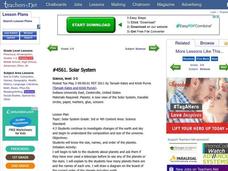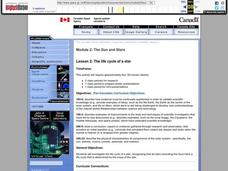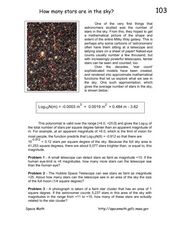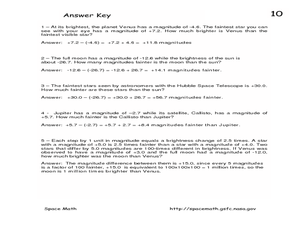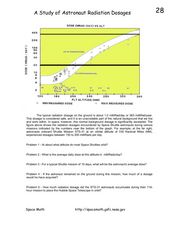Curated OER
April 25th Writing Prompt
In this daily writing prompt learning exercise, students learn that the Hubble Telescope was launched on April 25, 1990. Students comment on whether is it is beneficial to study the universe.
Curated OER
Star Search
Seventh graders explore stars. In this star instructional activity, 7th graders apply generalities about space objects to constellations and explore the differences between radio waves and light waves by answering essential questions in...
Curated OER
Cosmic Rays
Pupils study cosmic rays and the energy behind them. In this atmospheric instructional activity students complete a cosmic ray telescope project.
Curated OER
NASA Search
In this space learning exercise, students identify and locate vocabulary terms related to NASA and space. There are 31 words located in the puzzle.
Curated OER
Hello, Anybody Out There?
Students understand that people believe there may be life in other solar systems. In this communication with other solar systems lesson plan, students analyze our planet and write things they want to communicate to other solar systems.
Curated OER
The Hinode Satellite Views the Sun
In this sun's magnetic field lines learning exercise, students use a photograph taken by the Hinode Satellite that shows the complex magnetic structure of the sun over a sunspot. Student predict the magnetic field lines and draw them on...
Curated OER
The Electromagnetic Spectrum
Students describe and interpret the science of optical and radio telescopes, space probes and remote sensing technologies. They explain the role of radio and optical telescopes in determining characteristics of stars and star systems,...
Curated OER
Color Recognition
Students envision how space observatories make use of monochromatic filters to collect data on the color of objects in space. They see the actual colors of objects when they are in monochromatic light.
Curated OER
Project SETI.
Tenth graders study how to search for life in outer space and make use of the 40-foot radio telescope at Greenbank, West Virginia. Request that the telescope be pointed at a particular location and time and receive data back from it...
Curated OER
Solar System
Young scholars study space. In this solar system lesson, students discover the correct order of the planets and create a diagram showing this knowledge. They listen to the book A New View of the Solar System and then work in groups on...
Curated OER
The Impact
Young scholars study different inventors and inventions. In this invention introduction lesson students pretend that they are an inventor and come up with their own invention.
Curated OER
Worksheet 19: Ship Positions
In this math worksheet, students read informational paragraphs and then answer 18 questions using data from their readings. Questions are about vectors, positions, distance and orbits.
Curated OER
Organic Molecules Detected on Distant Planet!
Here is a planet worksheet in which learners read about organic molecules detected through spectral lines of the planet Osiris. They calculate the mass, the volume and the densities of common ingredients for planets including Osiris and...
American Museum of Natural History
Planetary Mysteries
Get to know our little part of the vast universe. Learners read about the common and not-so-common facts about each of the planets in the solar system. The interactive lesson includes a large amount of information as well as a quiz to...
Curated OER
Cross Sections and Collision Times
High schoolers solve five problems including finding the cross sectional area of two bodies, determining the swept out volume of a moving body, finding the average particle volume of a body and determining the collision time for a body.
University of Colorado
Phases of Charon
Pluto, although no longer considered a planet, has five moons. Pluto's moon, Charon, is the focus of a resource that describes how the moon is viewed from the surface of Pluto. Photos help individuals see how Charon would look at...
Curated OER
The Life Cycle of a Star
Students investigate the life cycle of a star through research. Once research is complete, students prepare posters and present findings to class. Flash animation is included to help students visualize life cycle of star researching.
University of Colorado
Phases of Charon
Charon, the largest of Pluto's moons, was discovered in 1978. Lesson is a walk through of how to solve for the phases of Charon. It uses two different points on Pluto and takes into account the tilt of the pole, the rotational axis, and...
Curated OER
How Many Stars in the Milky Way?
Students perform an experiment in which they will use a statistical method called `sampling' to count to a billion (and beyond). Students practice sampling by estimating the number of characters on a page from the classified section of a...
Curated OER
How Many Stars are in the Sky?
In this star count instructional activity, students solve three problems using a given polynomial and its logarithm to determine the number of stars in a given area.
Curated OER
The Stellar Magnitude Scale
In this stellar magnitude scale worksheet, learners use a scale showing the magnitude of objects in the sky to answer 5 questions about the brightness of the moon, the planets and stars.
Curated OER
Power Functions: A Question of Magnitude
In this power functions worksheet, learners read about determining the brightness of stars using a magnitude scale. Students solve 4 problems including finding the magnitude differences of stars and determining equivalent magnitudes.
Curated OER
A Study of Astronaut Radiation Dosages
In this astronauts and radiation worksheet, learners use a graph that shows the altitude of an astronaut versus the exposure to radiation to solve 5 problems. Students interpret the graph to express the amount of radiation at varying...
Curated OER
Habitable Zones
Students focus on stellar luminosities to estimate size of habitable zones, map out habitable zone around hot light bulbs that serve as models of stars, investigate how size of model "habitable zone" around light bulbs depends on...











